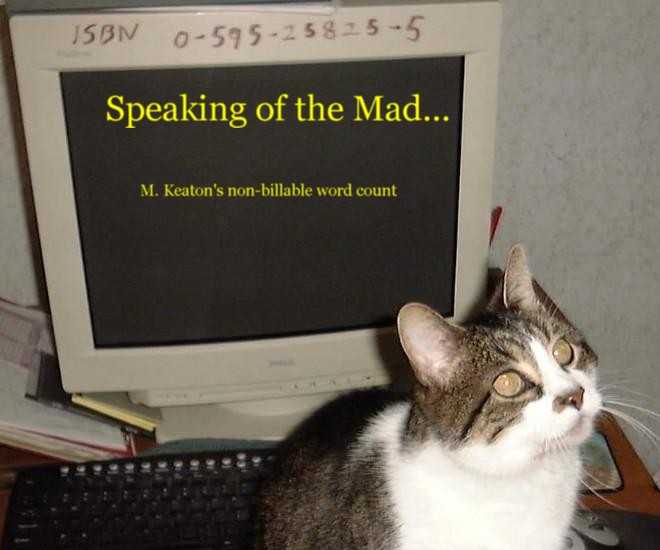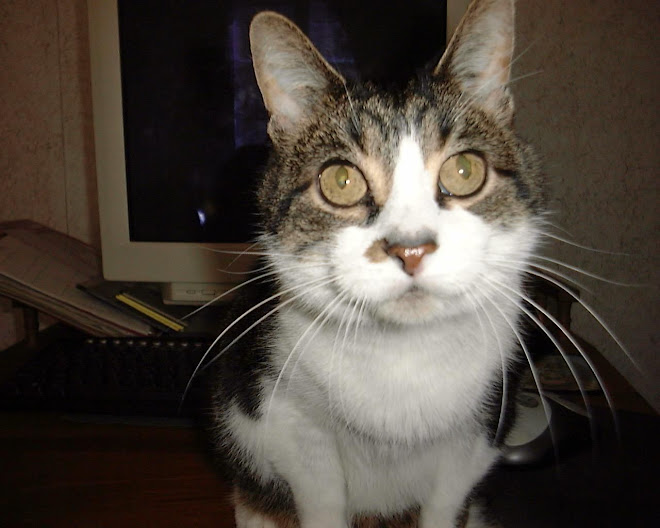I finally mewed at the Thin Man until he agreed to explain, at least in brief, his philosophy of the soul and why animals do go to heaven. Because it is pedantic and of little interest to the reader (in his opinion) he wants me to spread it out (I’m thinking of instituting ‘TheoTuesdays’ like the current ‘ConspiriThursday’) and he insists on the following disclaimer:
There are public theologies and private thoughts. Likewise, there are core, vital doctrines and then there are those speculations that are not truly relevant in the grand scheme of Salvation. This is a private speculation based largely on two foundations: the fact that it seems intuitively correct and does not contradict anything extant in the Holy Writ; and a reasoned extension of the already-displayed character and consistency of God documented in the Holy Writ. These are one man’s thoughts in the long hours of the night and should not be considered in any way worthwhile doctrine or even subjects of debate (except, perhaps, where the reader may find the Holy Ghost prompting within—and at that point it is an issue between God and the reader).
[This is the last part of the Thin Man's fat essay: "A Brief Discourse on the Animistic and Anthropomorphic Extensions of the Nature of the Soul". Hope you enjoyed the ride.]
Throughout human history, the belief that animals will exist in heaven has been present. They may be present as prey to be hunted, mounts to be ridden, or pets to be coddled but they are there. It seems that to question their presence in the afterlife is a modern invention rather than an age-old question. The sheep of the shepherd and the fish of the fisherman apostles will be present. This is intuitively known; it is only later that men began to ask how. Animals do not possess souls of their own (souls seem to be the province of humans alone) and so, we are taught, only souls pass from the mortal to the immortal world. Does that mean there are, in fact, no animals in heaven? How grotesquely we underestimate God.
If the influence of the soul can be extended to other humans, why can the same not be true of animals? Indeed, since animals do not possess souls of their own, would it not stand to reason that, for a time, they borrow a portion of a person’s soul to use as their own? And if the spirit arises from the interaction of body and soul, then would this not explain why certain animals seem to have very human personalities while others, more distant to humans, remain ‘simply’ animals? (In fact, I would extend this beyond animals and out to include things such as trees and the land itself.)
Let me specifically address animals on three different levels: pets, livestock (and prey), and incidental contact.
It is with pets that this theory needs the least explanation except to clarify that, as with people, a pet may be influenced by more than one human being. It is not about the animal’s owner, but about the people who invest themselves in the animal.
Livestock (animals raised for food) and prey (animals hunted for food) are more difficult to explain. The reason is because many people (including many farmers and hunters) do not understand the love that exists between the herdsman, the hunter, and the beasts of field and forest. To an animal, the human is their god. It is man who sets the time of their coming and going, the days of their lives and the tasks they perform in between. And with that power comes a terrible duty—a duty that, without a deep and abiding love, is impossible to perform properly. That the animal must, in the end, die is inconsequential to the greater truth that, first, the animal must live and live well. But man is not God and he cannot change what must be. He cannot cure all of the disease, cannot ease all the suffering, and, in the end, man’s duty to his family and his clan requires that the animal he loves so much must fulfill one final role. Many a farmer grieves the slaughter; many hunters weep for the fallen. This relationship is one of those matters that, I fear, cannot be fully explained, only understood or not depending on the experiences of the person involved.
I cite incidental contact as an example of the natural empathy that exists between man and animal. A pet or herd animal is well known, but the great stag seen in passing or the hawk that alights once in the yard and is never seen again may still have a profound effect on the viewer. It seems logical, then, to believe that in these small contacts some transference and investment occurs just as it does when two humans meet as strangers. There is still contact, there is still significance.
Do animals go to heaven? Yes; they ride along with us, as part of our souls, parts that we loaned to them while we shared this life together and that they give back to us increased a hundredfold.
I honestly don’t feel that this is a sufficient explanation and by no means complete but it is the best I can express in the time at hand. In no way do I believe this fragile theory of mine should be used as a basis for any doctrine nor is it an excuse to somehow worship the creation instead of the Creator. I state all these things only that you, the reader, may think about it and, perhaps, find in the contemplation a portion of the wonder and mystery, the glimpse of God’s glory in nature that I have found.
Subscribe to:
Post Comments (Atom)





















No comments:
Post a Comment